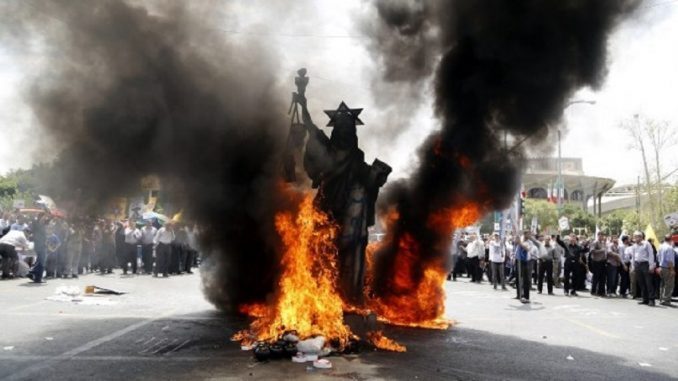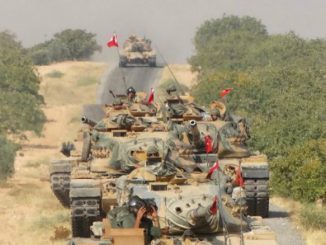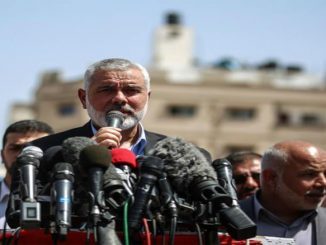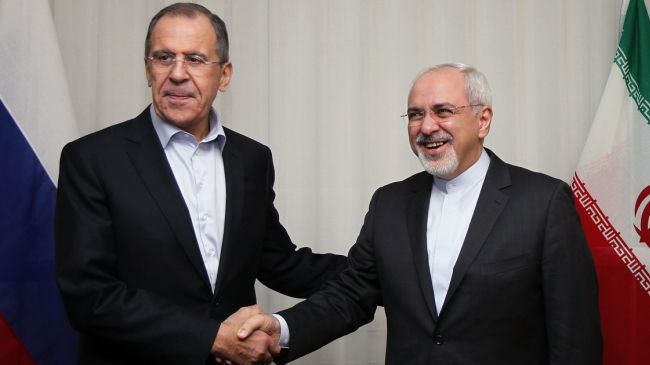
Iran started to counter the US measures and threats by imposing its own sanctions against various US companies, alleging they support terrorism, repression, and Israel’s occupation of Palestine,
Iran made a historic nuclear deal with P5+1 powers in 2015, in which Tehran agreed to amend its nuclear output in order to lift all nuclear-related economic sanctions, freeing up tens of billions of dollars in oil revenue and frozen assets.
After lifting the sanctions, Iranian president Hassan Rouhani visited Europe and made deals that worth billions of dollars. European companies started looking for investment opportunities in the growing Iranian market.
However, Donald Trump has said during his election campaign that Iran’s nuclear deal as “disastrous” and said it would be his “number one priority” to dismantle it.
These threats became clearer after Trump’s inauguration, as he signed an executive order temporarily barring thousands from seven countries in the Middle East and Africa, including Iran, from obtaining visas to travel to the United States.
The tension was raised again in issues related to Iran’s ballistic program, as he said that “Iran is playing with fire” and announced that “we’re officially putting Iran on notice,” after Iran conducted a failed ballistic missile test.
In addition, Trump declared in January applying sanctions on 25 individuals and companies connected to Iran’s ballistic missile program and those providing support to Iran’s Islamic Revolutionary Guard Corps’ Quds Force.
Recently, US senators said plan to impose new sanctions on Iran over its ballistic missile program, while Israel and Saudi Arabia backed these measures and described Iran as the main sponsor of global “terrorism” and a destabilizing force in the Middle East.
Hitting the US back
An Iranian foreign ministry statement carried by the state-run IRNA news agency on Sunday said the sanctions barred companies from any agreements with Iranian firms, and that former and current directors would not be eligible for visas into Iran.
It also said any of the company’s assets in Iran could be seized.
“The sanctioned companies have, directly and/or indirectly, been involved in the brutal atrocities committed by the Zionist regime in the occupied Palestinian territories, or they have supported the regime’s terrorist activities and Israel’s development of Zionist settlements on the Palestinian soil,” the IRNA report said.
The report referred to the sanctions as a “reciprocal act,” without elaborating.
The wide-ranging list from an American real estate company to a major arms manufacturer appeared more symbolic than anything else, as the firms were not immediately known to be doing business anywhere in the Islamic Republic.
The companies named did not immediately respond to requests for comment on Sunday.
Among the companies targeted are ITT Corp., missile-maker Raytheon Co. and truck maker Oshkosh, which has worked closely with Israeli armoured products maker Plasan.
The Israeli defense ministry is reportedly seeking to buy some 200 tactical trucks from the Wisconsin-based company.
Kahr Arms and Magnum Research, two sanctioned firms which share the same parent company, advertise .44-caliber Magnum and .50-caliber “Desert Eagle” pistols – a product line that previously has been made in Israel.
In addition, a senior Iranian politician was reported as saying that Iran would consider a bill branding the US military and the Central Intelligence Agency “terrorist” groups if the US Congress passes a bill designating Iran’s Revolutionary Guard a “terrorist” organization.
Restoring the Nuclear Program
Iranian politicians said that Tehran’s counter-measures won’t be with speeches, as Foreign Minister warned that that Tehran is ready to restore its nuclear program if the US fails to live up to its commitments under the July 2015 nuclear deal
Speaking to reporters in the central Iranian city of Esfahan on Monday, Javad Zarif threatened to break the nuclear deal.
“Iran is fully prepared to return to the pre-JCPOA situation or even [to conditions] more robust than that if the US reneges on its promises to the extent that the JCPOA’s continuation harms our national interests,” Zarif said.
Zarif said Iran was “committed to the promises it has made” and that the regime’s supreme leader Ali Khamenei had stipulated that Iran “is not to break them,” according to the official Islamic Republic News Agency.
But, he warned, it could do so very quickly if the agreement falls through, and the restored nuclear program would be more advanced that the one mostly frozen by the 2015 deal.
“During the past couple of months, with the efforts made by skilled Iranian scientists and experts, we have succeeded [in making] operational the most advanced centrifuges, that were just an idea at the time of approving the JCPOA,” Zarif was quoted as saying, adding, “At present, we possess the know-how to manufacture and use centrifuges with [an enrichment] capacity 20 times more than that of previous centrifuges.”
He accused the US of repeatedly failing to fulfill its commitments under the deal, but said “pursuing the JCPOA is still justifiable for Iran” for economic reasons.



